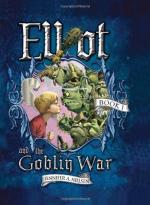For answer, Mysie burst into tears, her shoulders heaving with the sobs of her grief, her breast surging and falling, while her little hands covered her eyes, as she stood with bent head, a pitiable little figure.
“What is it, Mysie?” he enquired, his hands at once going tenderly over her bent head, and caressing it as he spoke, “What is it, Mysie? Tell me. Hae I vexed you by speakin’ like that? Dinna greet, Mysie,” he went on soothingly, his voice soft and tender, and vibrant with sympathy and love. “Dinna greet. But tell me what’s wrang. I’m sorry if it’s me that has done it, Mysie. Maybe I hae frightened you; but, there now, dinna greet. I didna mean ony harm!” and he stroked and caressed her hair softly with his hands, or patted her shoulders at every word, as a mother does with a fretful child.
“There noo, Mysie, dinna greet,” he said again, the soft, soothing note of vexation in his voice growing more tender and husky with emotion. “Look up, Mysie, for I dinna like to see you greetin’. It maun be something gey bad, surely, to mak’ you greet like this,” and his hands seemed to stab her with every tender touch, and his soft words but added more pain to her grief.
But still Mysie never answered. Her tears instead flowed faster, and her sobs grew heavier, until finally she moaned like a stricken animal in pain.
“Mysie! Mysie! my dochter, what is it?” unable to control himself longer. “Surely you can tell me what ails you? What is it, Mysie? Look up, my dear! Look up an’ tell me what ails you!”
“Oh, dear! Oh, dear!” moaned Mysie, the floodgates of her grief now wide, and her soul in torture.
“Mysie,” he cried, taking her head between his hands and raising it up, “what is it that’s wrang with you? Is it me that is the cause o’ you being vexed?”
“Oh, no, no,” she moaned, trying to avert her face. “Oh, dinna, Rob!” she pleaded, and the old familiar name smote him and thrilled him as of old.
“Tell me what is the matter,” he said, a stronger note in his voice, the old masterful spirit asserting itself again. “What is wrang wi’ you? I can’t understand it, an’ I wish to try an’ help you.”
But still she sobbed and there was no answer.
“Look here,” he said. “Tell me plainly if I have been the cause of this.”
“No; oh, no,” she sobbed, again hiding her eyes with her hands.
“Very weel, then,” he went on. “Will you no’ tell me what is wrong? I canna understand it unless you tell me. Are you in ony trouble o’ ony kind? Speak, Mysie.” Then, his voice becoming more pleading in its tones, “Wad you be feart to be my wife, Mysie? I aye thocht you cared for me. I hae loved you a’ my days. You maun ken that, I think. Speak up, Mysie, an’ tell me if you care for me. I want you, an’ I maun ken what you think o’ it. Come, Mysie, tell me!”
“Oh, dinna ask me, Rob,” she pleaded. “Dinna ask me!”




